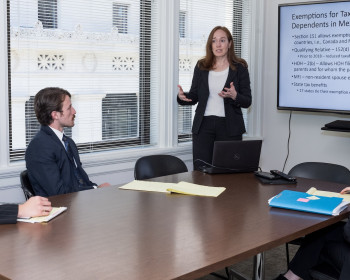LITC Legal Interns Recover $7,500 in Tax Refunds for Immigrant Taxpayer
Victorious efforts: Low Income Taxpayer Clinic interns’ triumph in securing tax refunds highlights the challenges faced by ESL taxpayers and the clinic’s commitment to overcoming barriers.
Open gallery

The Lewis & Clark Law School’s Low-Income Taxpayer Clinic (LITC) celebrates its legal interns’ achievement in recovering approximately $7,500.00 in past tax refunds for a single mother raising two children and grandchild. The client is an immigrant from Mexico, speaking Spanish natively and English as a second language. As an ESL taxpayer with three dependents to care for, not being able to receive 3 years of tax refunds was an undue hardship. The LITC is committed to serving low and moderate-income taxpayer families to overcome the barriers they face when appropriately claiming their tax refunds.
Over the span of 1.5 years, totaling five semesters, seven LITC legal interns worked on the case: Brad Doering ’24, Mickayla Dow ’24, John Ficklen ’23, Gagan Gill ’24, Seth Howell ’24, Justin Quinlan ’23, Britt Ryan ’23, and Bree Yamada ’24. They identified and resolved each of the client’s tax issues, including the renewal of her Individual Taxpayer Identification Number (ITIN), which was necessary for the IRS to process her tax returns. Although the client dutifully filed her tax returns each year, she did not receive notice that the tax returns were not processed by the Internal Revenue Service (IRS) due to an expired ITIN. An ITIN renewal is a burdensome process that affects only immigrants, nonresidents, or undocumented taxpayers. The LITC serves to alleviate barriers for its clients involved in IRS disputes, such as language misunderstandings and difficult administrative processes. To learn more about the clinic’s experience with ITIN applications and renewals, read Professor Sarah Lora’s comments here.
After successfully renewing the client’s ITIN and filing the appropriate tax forms and legal arguments, the legal interns awaited updates from the IRS’ Taxpayer Advocate Service’s (TAS). Within a few months, the LITC client finally received her tax refunds.
More Low Income Taxpayer Clinic Stories
email litc@lclark.edu
voice (503) 768-6500
fax (503) 768-6540
333 SW 5th Ave.

